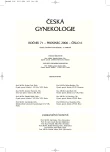-
Medical journals
- Career
Mechanisms Influencing Implantation of the Embryo – the Last-Years’ News
Authors: K. Nouza 1,2; J. Madar 1,3; E. Kučera 1,3; M. Nouza 2; M. Tolarová 1; D. Nováková 3
Authors‘ workplace: Ústav pro péči o matku a dítě, Praha, ředitel doc. MUDr. J. Feyereisl, CSc. 1; Centrum klinické imunologie, Praha, přednosta MUDr. M. Nouza, CSc. 2; 3. lékařská fakulta Univerzity Karlovy, Praha, děkan doc. MUDr. J. Svoboda, CSc. 3
Published in: Ceska Gynekol 2006; 71(6): 489-494
Category: Original Article
Overview
Objective:
To summarize recent knowledge concerning mechanisms which influence the implantation of embryo.Design:
Literature-based overview.Setting:
Institute for the Care of Mother and Child, Prague.Subject of the study:
Factors influencing implantation of embryo in the uterus elicit increased interest due to study of unexplained failures of embryotransfer following the successful in vitro fertilization. Our article points to recent information about physiology and pathology of mechanisms controlling implantation, namely the factors of immunity (antibodies, cells, cytokines and other mediators) whose exact regulation on the feto-maternal interface is a crucial precondition of successful implantation. Also the genetics of early embryo, as well as the possibilities of modern endoscopic techniques offer new insight onto mechanisms of implantation. Recommendations for diagnostics and treatment of implantation failure are given in the end of the article.Key words:
embryo implantation, immunologic factors, genetic factors, infertility
Labels
Paediatric gynaecology Gynaecology and obstetrics Reproduction medicine
Article was published inCzech Gynaecology

2006 Issue 6-
All articles in this issue
- Clinical Comparison of Laparoscopy-Assisted Vaginal Hysterectomy (LAVH) and Total Laparoscopy Hysterectomy (TLH) in Women with Benign Disease of Uterus – a Prospective Randomized Study
- The Impact of Total Abdominal and Laparoscopically Assisted Vaginal Hysterectomy on the Development of Urine Incontinence
- Glandular Premalignant Lesions of the Uterine Cervix
- Possibile Utilization the Vaginal Ultrasonography as the Prebioptic Method in Diagnostics of Cancer of Endometrium through the Mediation the So-called EMI (endometrium/myometrium index)
- New Options in Reconstructive Pelvic Floor Surgery and Surgery in Urogynecology
- A Survey of Surgical Techniques Used for the Correction of Statics Disorders of Pelvic Floor
- Placenta and Annexin V Receptors, Antibodies against Annexin V and against Other Phospholipids in Patients with Recurrent Pregnancy Loss
- Basal Concentrations of FSH (Follicle Stimulating Hormone) as a Predictor of Succes of IVF-OCSI Cycle
- Methods of Assisted Reproduction in HIV Posivtive Patients
- Cardiovascular Risk and Estrogens
- Mechanisms Influencing Implantation of the Embryo – the Last-Years’ News
- Contribution and Selected Risks of Blood Transfusion
- Hormonal Contraception Possible Interactions
- Czech Gynaecology
- Journal archive
- Current issue
- Online only
- About the journal
Most read in this issue- Clinical Comparison of Laparoscopy-Assisted Vaginal Hysterectomy (LAVH) and Total Laparoscopy Hysterectomy (TLH) in Women with Benign Disease of Uterus – a Prospective Randomized Study
- Hormonal Contraception Possible Interactions
- Placenta and Annexin V Receptors, Antibodies against Annexin V and against Other Phospholipids in Patients with Recurrent Pregnancy Loss
- The Impact of Total Abdominal and Laparoscopically Assisted Vaginal Hysterectomy on the Development of Urine Incontinence
Login#ADS_BOTTOM_SCRIPTS#Forgotten passwordEnter the email address that you registered with. We will send you instructions on how to set a new password.
- Career

